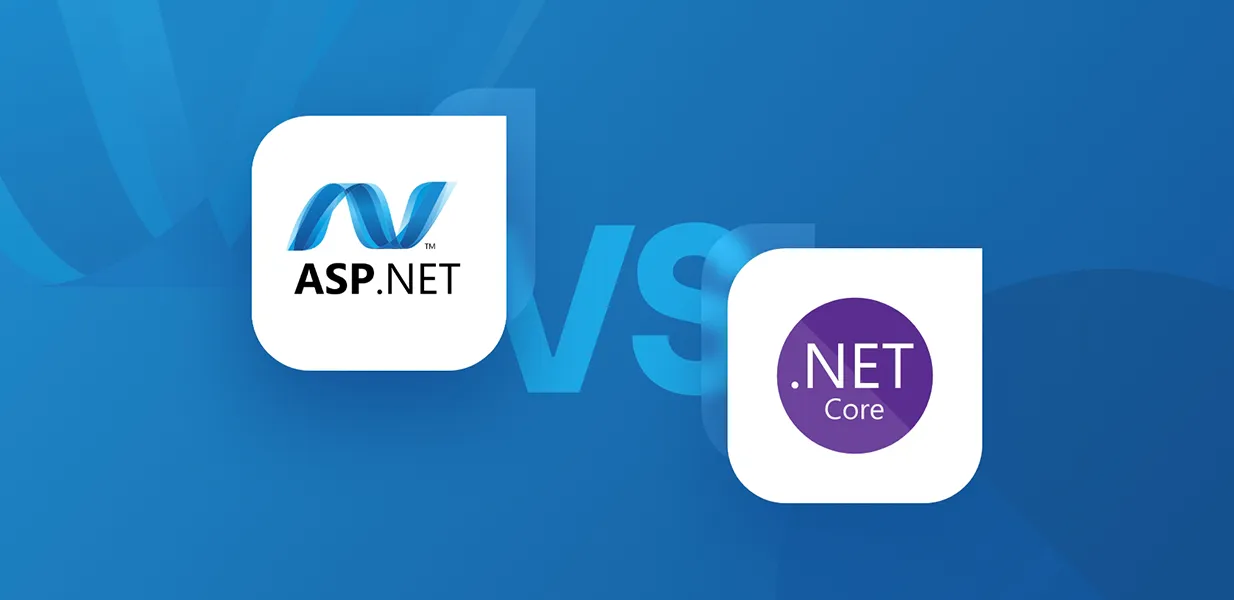
ASP.NET vs. ASP.NET Core - What is the difference between them

There used to be a time when we coded everything from scratch. Custom-made projects were laborious and time-consuming, and the greater flexibility offered by this approach came at a great cost.
Doing so today would be almost impossible. Not because of a lack of skill or time but because software nowadays is much more advanced, requiring multiple languages and increasingly complex tools.
Luckily for us, new ways of approaching new challenges also emerged. Boilerplate code, frameworks, and libraries allow us to build a web application faster and more efficiently.
Two of the biggest platforms in the web development space are .NET and .NET Core. Their names sound eerily similar, and for a good reason, as Core is the spiritual successor to . NET.
This article will dive into the differences between these two platforms, including their capabilities and use cases.
What is ASP.NET?
ASP.NET is a fundamental web development platform released in 2002 by Microsoft. It is based on the .NET framework, and it focuses on simplifying the development of web applications. It allows developers to build dynamic web pages, web services, and applications.
The platform uses HTTP commands (such as GET and POST), HTML, CSS, and JavaScript to create web applications. It also has its page definition syntax called ASP.NET Razor, which helps with server-side coding tasks such as embedding server code in a web page, accessing data, and creating a consistent look across web pages.
ASP.NET is built on the Common Language Runtime (CLR), allowing developers to write ASP.NET code using any .NET language, including C# and VB.NET.
Some key features of ASP.NET include:
- A rich set of controls and components that simplify the development process and allow for faster deployment times.
- Support for both the C# and VB.NET languages, allowing developers to write code in their preferred language.
- ASP.NET MVC and web API support allow separation of concerns and better code organization when building web applications.
- Built-in security features to protect web applications from malicious attacks and unauthorized access.
- Integration with other Microsoft technologies, such as Windows Communication Foundation and Windows Workflow Foundation.
What is ASP.NET Core?
ASP.NET Core is a redesign and re-implementation of ASP.NET, focusing on performance and multi-platform support. It is built to support cross-platform development and offers a ready-made configuration in a cloud environment.
When Microsoft redesigned ASP.NET, it changed the underlying structure and philosophy. ASP.NET Core is now built on top of .NET Core, a new modular framework that can run on multiple operating systems and has independent release cycles.
This allows for faster development, updates, and improved performance and scalability. The goal is to make ASP.NET obsolete and transition all development to ASP.NET Core.
The .NET Core ASP framework is open source, which means that developers from all over the world can contribute to its development.
Some critical components of this framework include:
- A new, modular framework allows for faster performance and easier customization.
- Cross-platform support allows developers to build applications for any operating system.
- Combining MVC framework and Web API in a single web programming framework for better code organization and separation of concerns. While the ASP.NET MVC still works, it isn’t being actively developed, and there are no plans to release any new features or updates. (See more on ASP.NET MVC Vs ASP.NET Core and the primary differences between the two)
- .NET Core supports UWP (Universal Windows Platform), Microsoft's platform for building modern, touch-enabled apps that can run on any Windows device.
- Access to WPF and Windows Forms. WPF is a graphical subsystem for rendering user interfaces in Windows-based applications, and Windows Forms is a GUI class library included with NET Framework.
ASP.NET vs ASP.NET Core: side-to-side comparison
ASP.NET Core is a general-purpose, modular, cross-platform, and open-source platform for building web apps. It also has a new and improved dependency injection system, which allows for easier management of software components.
ASP.NET can do all this too, but it’s not as fast and efficient. And while it can work on multiple operating systems (through Mono Framework ), it runs best on Windows.
ASP.NET Core is also built on top of .NET Core, while ASP.NET runs on the full .NET framework. This means that ASP.NET Core can run on any operating system, while ASP.NET is essentially Windows-specific.
While ASP.NET Core is the future of ASP.NET, it’s important to note that not all features from ASP.NET have been implemented in ASP.NET Core.
For example, Web Forms, a framework for building event-driven web applications in a cloud environment, is not currently supported in ASP.NET Core. However, it can be ported with the right skills and strategic planning. In our ASP.NET Web Forms to Modern ASP.NET migration whitepaper, we guide you through the steps.
Ultimately, if we must compare ASP.NET vs ASP.NET Core, both frameworks can be used for web development, but the latter offers better performance and flexibility with its modular design and cross-platform support.
ASP NET vs ASP NET Core - what are the differences between them
Since ASP.NET Core is a complete redesign and re-implementation of ASP.NET, there are many significant differences to consider when deciding which platform to use for your project.
- Compatibility: One key difference is compatibility. The original ASP.NET can run on Linux, but it'll work better on Windows servers as they natively support the underlying .NET Framework. ASP.NET Core, on the other hand, can run on Windows, macOS, and Linux servers.
- Performance: ASP.NET Core also offers better performance and scalability thanks to its modular framework, lightweight implementation, and cross-platform compatibility.
- Ecosystem: The original ASP.NET, with a 20-year history, has a larger ecosystem, with more libraries and community support. However, this will undoubtedly change as ASP.NET Core continues to grow and gain popularity.
- Support: ASP.NET will soon be dropped from Microsoft's official support schedule, and all future development efforts will be focused on ASP.NET Core. The platform will only receive security updates, but any new feature development will only happen on ASP.NET Core.
Benefits of using ASP.NET Core
When starting a new project and picking a framework, it may be tempting to stick with what you know. Which might very well be ASP.NET. But ASP.NET Core might be a better fit for your project; here’s why:
- Improved performance – ASP.NET Core has been designed with performance in mind, resulting in faster response times and improved efficiency. It's not that ASP.NET is slow, but ASP.NET Core's performance has been greatly optimized.
- Multi-platform support – ASP.NET Core allows for the flexibility of building services for multiple operating systems that can run locally, while ASP.NET is limited to servers only.
- This makes this net framework a cross-platform framework, which means you only must build web apps once to have it run on all platforms (including Linux and MAC operating systems).
- Open source – ASP.NET Core has a larger community of developers who can provide support and resources. That's very helpful since developing is always a team effort. And the team extends beyond the developers at your company.
- Ask any .NET developer how often they must peek at Stackoverflow for solutions while coding.
Of course, any new technology may have a few drawbacks. And this is true for ASP.NET Core as well. The main flaw is the lack of support for older technologies from this NET framework.
While ASP.NET Core works on multiple platforms, it may not support older technologies still being used by some companies.
Choosing between ASP.NET and ASP.NET Core for web application development
Since ASP.NET Core is the replacement for ASP.NET the choice is simple. When starting a new project, you should definitely pick Core, as it will keep receiving support and new features over time. There are no technical limitations to going with modern .NET, only benefits to gain.
However, if your project relies heavily on older technologies that are incompatible with ASP.NET Core, it might not be a good fit for you. In that case, stick with ASP.NET until those older technologies can be updated or replaced in the future, but start planning a migration path now.
The biggest weakness of picking ASP.NET for building web apps is that it will eventually become obsolete. That means it will only receive security updates and bug fixes but no new features or improvements. Further, obsolete technologies attract fewer engineers, which makes your technical team harder to retain and grow over time.
Get your modernization right with Resolute Software
Using modern technologies ensures your web applications will stay secure and perform for the foreseeable future. We specialize in modernizing software to keep up with rapidly changing technologies. We have the experience and expertise to help you with your ASP.NET Web forms modernization.
Contact us today to learn more about how we can help you get the most out of ASP.NET Core.
FAQs
While both platforms are part of the .NET ecosystem, ASP.NET Core is a redesign and re-implementation of ASP.NET, that will eventually replace it. This means that ASP.NET will become legacy, while ASP.NET Core will be the new standard for web application development.
No, they are not the same. They have different focuses and capabilities, and can coexist in the same project. .NET Core is a closed-source web framework specifically made for web development, while ASP.NET Core is a more general framework.
No. The .NET Framework is a software development framework for building and running Windows applications. .NET Core is a different framework that includes ASP.NET Core and can be used for cloud-based web apps as well as non-web applications on multiple platforms.
If you’re building a new web application, ASP.NET Core is the superior choice, as ASP.NET will be discontinued soon. However, if you already have a working ASP.NET project, then it might be better to stick to that platform until it will be possible to migrate all features.






